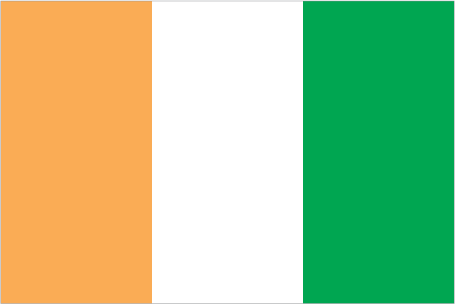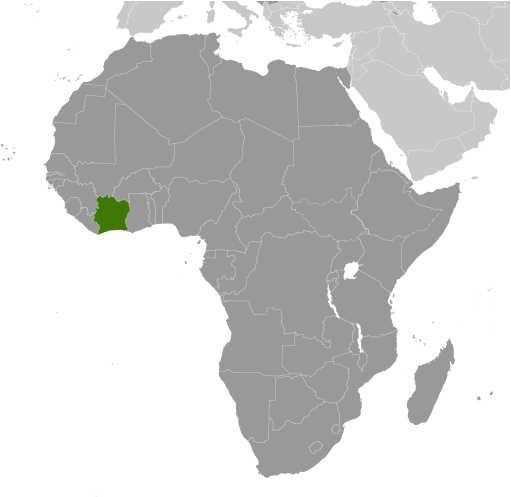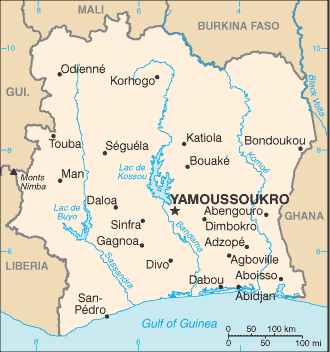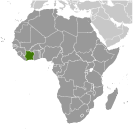
|
|
Advertisements:
GovernmentCountry name
Conventional long form Republic of Cote d'Ivoire
Conventional short form Cote d'Ivoire Local long form Republique de Cote d'Ivoire Local short form Cote d'Ivoire Note Pronounced coat-div-whar Former Ivory Coast Government type
Republic; multiparty presidential regime established 1960 Capital
Name Yamoussoukro
Geographic coordinates 6 49 N, 5 16 W Time difference UTC 0 (5 hours ahead of Washington, DC during Standard Time) Note Although Yamoussoukro has been the official capital since 1983, Abidjan remains the commercial and administrative center; the US, like other countries, maintains its Embassy in Abidjan Administrative divisions
19 regions; Agneby, Bafing, Bas-Sassandra, Denguele, Dix-Huit Montagnes, Fromager, Haut-Sassandra, Lacs, Lagunes, Marahoue, Moyen-Cavally, Moyen-Comoe, N'zi-Comoe, Savanes, Sud-Bandama, Sud-Comoe, Vallee du Bandama, Worodougou, Zanzan Independence
7 August 1960 (from France)
Constitution
Approved by referendum 23 July 2000 Legal system
Civil law system based on the French civil code; judicial review in the Constitutional Chamber of the Supreme Court International law organization participation
Accepts compulsory ICJ jurisdiction with reservations; accepts ICCt jurisdiction under Article 12(3)of the Rome Statute Suffrage
18 years of age; universal
Executive branch
Chief of state
President Alassane Dramane OUATTARA (since 4 December 2010) Head of government Prime Minister Jeannot Kouadio-AHOUSSOU (since 13 March 2012) Cabinet Council of Ministers appointed by the president Elections President elected by popular vote for a five-year term (no term limits); election last held on 31 October and 28 November 2010 (next to be held in 2015); prime minister appointed by the president Election results Alassane OUATTARA elected president; percent of vote - Alassane OUATTARA 54.1%, Laurent GBAGBO 45.9%; note - President OUATTARA was declared winner by the election commission and took the oath of office on 4 December, Prime Minister SORO resigned from the incumbent administration and was subsequently appointed to the same position by OUATTARA; former president GBAGBO refused to cede resulting in a 5-month stand-off, he was finally forced to stand down in April 2011 Legislative branch
Unicameral National Assembly or Assemblee Nationale (225 seats; members elected in single- and multi-district elections by direct popular vote to serve five-year terms) Elections Elections last held on 11 December 2011 (next to be held in 2016) Election results Percent of vote by party - NA; seats by party - RDR 127, PDCI 93, independents 5; note - certified results have yet to be posted Judicial branch
Supreme Court or Cour Supreme consists of four chambers: Judicial Chamber for criminal cases, Audit Chamber for financial cases, Constitutional Chamber for judicial review cases, and Administrative Chamber for civil cases; there is no legal limit to the number of members Political parties and leaders
Citizen's Democratic Union or UDCY [Theodore MEL EG]; Democratic Liberty for the Republic or LIDER [Mamadou KOULIBALY]; Democratic Party of Cote d'Ivoire or PDCI [Henri Konan BEDIE]; Freedom and Democracy for the Republic or LIBRE [Mamadou KOULIBALY]; Ivorian Popular Front or FPI [Miaka OURETO]; Ivorian Worker's Party or PIT [Francois KOUABLAN]; Opposition Movement of the Future or MFA [Innocent Augustin ANAKY]; Rally of the Republicans or RDR [Alassane OUATTARA]; Union for Democracy and Peace in Cote d'Ivoire or UDPCI [Toikeuse MABRI]; over 144 smaller registered parties Political pressure groups and leaders
Federation of University and High School Students of Cote d'Ivoire or FESCI [Serges KOFFI]; National Congress for the Resistance and Democracy or CNRD [Bernard DADIE]; Rally of Houphouetists for Democracy and Peace or RHDP [Alphonse DJEDJE MADY]; Young Patriots [Charles BLE GOUDE] International organization participation
ACP, AfDB, AU, ECOWAS, Entente, FAO, FZ, G-24, G-77, IAEA, IBRD, ICAO, ICRM, IDA, IDB, IFAD, IFC, IFRCS, ILO, IMF, IMO, Interpol, IOC, IOM, IPU, ISO, ITSO, ITU, ITUC, MIGA, NAM, OIC, OIF, OPCW, UN, UNCTAD, UNESCO, UNHCR, UNIDO, Union Latina, UNWTO, UPU, WADB (regional), WAEMU, WCO, WFTU, WHO, WIPO, WMO, WTO Diplomatic representation in the us
Chief of mission Ambassador Daouda DIABATE
Chancery 2424 Massachusetts Avenue NW, Washington, DC 20008 Telephone [1] (202) 797-0300FAX [1] (202) 244-3088 Diplomatic representation from the us
Chief of mission Ambassador Philip CARTER
Embassy Cocody Riviera Golf 01, Abidjan Mailing address B. P. 1712, Abidjan 01Telephone [225] 22 49 40 00 FAX [225] 22 49 43 32 Flag description
Three equal vertical bands of orange (hoist side), white, and green; orange symbolizes the land (savannah) of the north and fertility, white stands for peace and unity, green represents the forests of the south and the hope for a bright future Note Similar to the flag of Ireland, which is longer and has the colors reversed - green (hoist side), white, and orange; also similar to the flag of Italy, which is green (hoist side), white, and red; design was based on the flag of France National symbol(s)
Elephant
National anthem
Name
"L'Abidjanaise" (Song of Abidjan) Lyrics/music Mathieu EKRA, Joachim BONY, and Pierre Marie COTY/Pierre Marie COTY and Pierre Michel PANGO Note Adopted 1960; although the nation's capital city moved from Abidjan to Yamoussoukro in 1983, the anthem still owes its name to the former capital
Comments
Add a new comment: |
Advertisement
Members area
Cote D Ivoire (Yamoussoukro):
 
GPS points from Cote D Ivoire (Yamoussoukro)
|
||||||||

 Close ties to France since independence in 1960, the development of cocoa production for export, and foreign investment made Cote d'Ivoire one of the most prosperous of the West African states but did not protect it from political turmoil. In December 1999, a military coup - the first ever in Cote d'Ivoire's history - overthrew the government. Junta leader Robert GUEI blatantly rigged elections held in late 2000 and declared himself the winner. Popular protest forced him to step aside and brought Laurent GBAGBO into power. Ivorian dissidents and disaffected members of the military launched a failed coup attempt in September 2002. Rebel forces claimed the northern half of the country, and in January 2003 were granted ministerial positions in a unity government under the auspices of the Linas-Marcoussis Peace Accord. President GBAGBO and rebel forces resumed implementation of the peace accord in December 2003 after a three-month stalemate, but issues that sparked the civil war, such as land reform and grounds for citizenship, remained unresolved. In March 2007 President GBAGBO and former New Forces rebel leader Guillaume SORO signed the Ouagadougou Political Agreement. As a result of the agreement, SORO joined GBAGBO's government as Prime Minister and the two agreed to reunite the country by dismantling the zone of confidence separating North from South, integrate rebel forces into the national armed forces, and hold elections. Disarmament, demobilization, and reintegration of rebel forces have been problematic as rebels seek to enter the armed forces. Citizen identification and voter registration pose election difficulties, and balloting planned for November 2009 was postponed to 2010. On 28 November 2010, Alassane Dramane OUATTARA won the presidential election, defeating then President Laurent GBAGBO. GBAGBO refused to hand over power, resulting in a five-month stand-off. In April 2011, after widespread fighting, GBAGBO was formally forced from office by armed OUATTARA supporters with the help of UN and French forces. Several thousand UN peacekeepers and several hundred French troops remain in Cote d'Ivoire to support the transition process.
Close ties to France since independence in 1960, the development of cocoa production for export, and foreign investment made Cote d'Ivoire one of the most prosperous of the West African states but did not protect it from political turmoil. In December 1999, a military coup - the first ever in Cote d'Ivoire's history - overthrew the government. Junta leader Robert GUEI blatantly rigged elections held in late 2000 and declared himself the winner. Popular protest forced him to step aside and brought Laurent GBAGBO into power. Ivorian dissidents and disaffected members of the military launched a failed coup attempt in September 2002. Rebel forces claimed the northern half of the country, and in January 2003 were granted ministerial positions in a unity government under the auspices of the Linas-Marcoussis Peace Accord. President GBAGBO and rebel forces resumed implementation of the peace accord in December 2003 after a three-month stalemate, but issues that sparked the civil war, such as land reform and grounds for citizenship, remained unresolved. In March 2007 President GBAGBO and former New Forces rebel leader Guillaume SORO signed the Ouagadougou Political Agreement. As a result of the agreement, SORO joined GBAGBO's government as Prime Minister and the two agreed to reunite the country by dismantling the zone of confidence separating North from South, integrate rebel forces into the national armed forces, and hold elections. Disarmament, demobilization, and reintegration of rebel forces have been problematic as rebels seek to enter the armed forces. Citizen identification and voter registration pose election difficulties, and balloting planned for November 2009 was postponed to 2010. On 28 November 2010, Alassane Dramane OUATTARA won the presidential election, defeating then President Laurent GBAGBO. GBAGBO refused to hand over power, resulting in a five-month stand-off. In April 2011, after widespread fighting, GBAGBO was formally forced from office by armed OUATTARA supporters with the help of UN and French forces. Several thousand UN peacekeepers and several hundred French troops remain in Cote d'Ivoire to support the transition process.